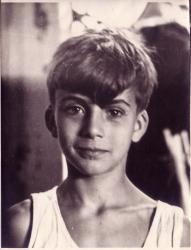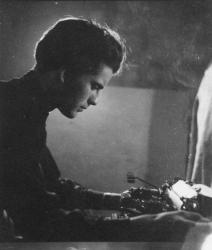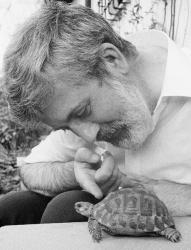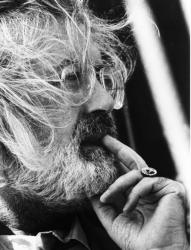Skip to main content
-
1929:
Michael Ende was born on November 12 in the Bavarian town of Garmisch-Partenkirchen, the son of the painter Edgar Ende from Hamburg and the jewellery seller Luise Bartholomä from Saarland.
-
1948:
Michael Ende starts training as an actor at the Otto-Falckenbergschule in Munich. Afterwards, he plays parts at several small theatres in Northern Germany.
-
1954:
Michael Ende works as a film critic for Bayerischer Rundfunk. Besides, he writes scenes and chansons for political cabaret and gets involved in organising “Schwabinger Fasching” (Swabian Carnival), which caused a worldwide sensation in the Fifties. Michael Ende studies Bert Brecht who he holds in the highest esteem.
-
1956:
Michael Ende’s dreams of the theatre break down. He falls into an artistic crisis and starts more or less aimlessly to write Jim Button. More than ten publishers refuse to publish the book.
-
1960:
At long last, Jim Knopf und Lukas der Lokomotivführer (Jim Button and Luke the Engine Driver) is published in Stuttgart by Thienemann Verlag. Michael Ende receives the Deutschen Jugendbuchpreis (German Award for Children’s Literature) for it.
-
1962:
Jim Knopf und die Wilde 13 (Jim Button and the Wild 13) is published, and the Hessische Rundfunk produces the filmed performance of Augsburger Puppenkiste, which is a great success.
-
1964:
Michael Ende and the actress Ingeborg Hoffmann get married in Rome.
-
1965:
On 27th December, his father Edgar Ende dies. His parents had been separated since 1953.
-
1972:
Twelve years after Jim Button and after six years of work, Momo is published in Stuttgart. Michael and Ingeborg Ende now live in Italy.
-
1973:
On 25 June, Michael Ende’s mother dies at the age of 81.
-
1974:
Momo receives the German as well as the European award for children’s literature. 1975 he writes an opera libretto with music by Mark Lothar.
-
1976:
With Das Gauklermärchen (The Minstrel’s Fairytale) Ende turns once more to the theatre.
-
1979:
Die unendliche Geschichte (The Neverending Story) comes out in Stuttgart.
-
1982:
With Phantasie/Kultur/Politik (Fantasy/Culture/Politics)– a publication about a round of political debates – Michael Ende takes the floor once more as a commentator of contemporary issues. It is the time of the great peace demonstrations against nuclear armaments. With Der Spiegel im Spiegel (The Mirror in the Mirror) he started in 1983 an inner debate with his father. The book is dedicated to him.
-
1984:
Michael Ende sees the film Die unendliche Geschichte (The Neverending Story) and is shocked. Furiously he has his name removed from the project.
-
1985:
On 3 February, the commissioned opera Der Goggolori (The Goggolori) has its successful premier at the Münchner Staatstheater am Gärtnerplatz. Wilfried Hiller wrote the music. On 27 March Michael Ende’s wife Ingeborg Hoffmann dies of pulmonary embolism, after having seen the film version of Die unendliche Geschichte (The Neverending Story). Michael Ende returns to Munich.
-
1986:
The film version of Momo has its premiere.
-
1989:
On 4 September Michael Ende marries Mariko Sato in Munich. She had translated Die unendliche Geschichte (The Neverending Story) into Japanese.
-
1994:
In June Michael Ende has surgery for cancer for the first time. He has to stop work at Mamonella oder der Geist in der Flasche (Mamonella or the Spirit in the Bottle) a commission for the reopening of Prinzregententheater in Munich.
-
1995:
On 28 August Michael Ende dies in the Filderklinik, a hospital near Stuttgart. All in all he received 41 awards for his artistic work.




